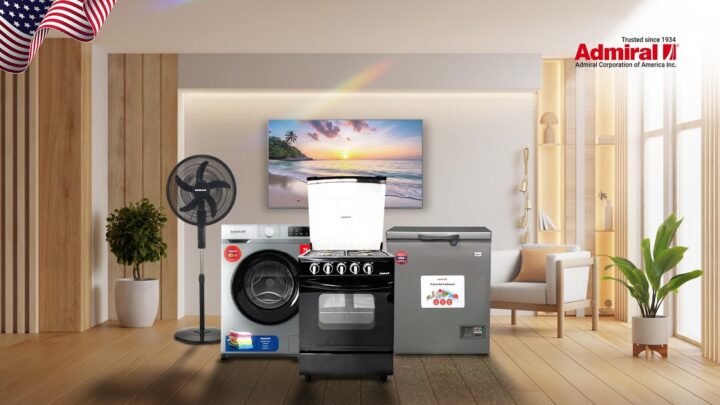A leading US-based appliance manufacturer is entering Nigeria’s booming smart home market, positioning itself to tap into growing demand for connected household technologies. The firm, renowned for its line of smart refrigerators, ovens, washing machines, and air conditioners, has officially launched its products in Nigeria and is partnering with local distributors to reach consumers nationwide.
The company is deploying its flagship smart‑appliance portfolio. These devices feature integrated Wi‑Fi connectivity, touch‑screen control panels, smartphone apps, voice‑assistant compatibility, and built‑in sensors that optimize energy consumption and performance. As prices come down and internet access expands in urban areas, Nigerian middle‑income homeowners and tech‑savvy consumers are showing increasing interest in modernising their living spaces.

In collaboration with Nigeria’s emerging smart‑technology retailers and tech‑services providers, the US brand is preparing to supply major cities, including Lagos, Abuja, Port Harcourt, and Kano. The machines are also being bundled with installation services, warranty packages, and home‑wireless connectivity support, to simplify adoption for first‑time users. The company is emphasising local content by training technicians and establishing authorised service centres for maintenance—including in secondary cities.
The move comes against the backdrop of rising urbanisation and energy concerns; many Nigerians are looking for appliances that can reduce electricity costs, regulate indoor climates more efficiently, and even harvest solar energy for off‑grid or irregular grid contexts. The appliances are designed to operate effectively under variable voltage conditions and intermittent power supplies, addressing a major pain point in many Nigerian homes.
Local tech experts and analysts believe this expansion could spur competition in the domestic appliances space, challenging existing brands and encouraging innovation in smart energy solutions. They anticipate that, as more consumers embrace Wi‑Fi‑enabled devices, other firms may follow suit, thereby accelerating Nigeria’s transition toward Internet‑of‑Things‑enabled homes.
Several landlords and real estate developers have already expressed interest in smart appliances for high‑end properties, gated communities, and boutique hotels. These sophisticated devices enhance convenience and can support remote monitoring, predictive maintenance, and even guest engagement through app‑based interfaces.
To support uptake, the company has launched promotional campaigns offering discounts, bundled packages, and flexible financing terms through local banks. Digital payments, mobile money, and rent‑to‑own schemes are being offered to boost affordability. These efforts aim to reduce the upfront cost barrier and persuade customers to shift from traditional appliances to smarter models.
Consumer reception during initial showrooms and demo events has been largely positive. Early adopters report satisfaction with features such as remote controls, automated temperature settings, and integration with solar battery systems. Comments highlight improved energy efficiency, reduced electricity bills, and modern aesthetics, though some customers note the learning curve associated with new technology interfaces.
However, adoption challenges remain. The high cost of smart appliances compared to conventional models is a deterrent for many consumers, particularly outside the top-tier urban centres. Issues such as limited and costly internet access, concerns about after‑sales service, and doubts over warranty enforcement also temper enthusiasm. The company is addressing these with extended warranty periods, locally stocked spare parts, and technician training initiatives.
Industry observers caution that the success of smart‑home appliances in Nigeria will depend on broader ecosystem improvements—such as stable and affordable power supply, widespread broadband access, and stronger technical support infrastructure. They also see regulatory standards and consumer‐protection policies as key to building trust in new appliance categories.
For the US manufacturer, Nigeria represents an important strategic market in its African expansion plans. With a population exceeding 200 million, rising urban middle classes, and expanding digital infrastructure, the country offers fertile ground for smart‑home technologies. The company’s officials state that they aim to gradually scale operations and adapt appliances to local needs—including solar integration, voltage management, and language localization in user interfaces.
Observers expect the company to roll out additional models in the coming year—such as smart cooking ranges, integrated home‑security systems, and solar‑compatible air‑conditioning units. If successful, its entry will mark a pivotal moment for the smart appliance segment in Nigeria and potentially influence competitors and regional adopters throughout West Africa.
As Nigeria’s consumers seek greater convenience, energy savings, and home automation, the launch of this US appliances maker may herald a new era in household technology—and signal a shift toward smart, connected living across the country.
Support InfoStride News' Credible Journalism: Only credible journalism can guarantee a fair, accountable and transparent society, including democracy and government. It involves a lot of efforts and money. We need your support. Click here to Donate
